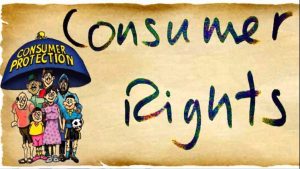In the digital age, your personal information is more valuable than ever. But how can you ensure that your privacy rights are protected and your data remains secure?
From understanding the legal frameworks for consumer privacy to empowering yourself in the digital landscape, this article will provide you with essential knowledge and practical tips.
Don’t let your information fall into the wrong hands – it’s time to take control of your consumer rights in this brave new world.

Understanding Your Privacy Rights
Understanding your privacy rights is crucial in the digital age. With the rapid advancements in technology and the increasing dependence on digital platforms, it is important to be aware of how your personal information is being collected, used, and shared.
As a consumer, you have the right to know what data companies are collecting from you and how they are using it. You also have the right to control your own data and decide who has access to it.
Protecting your privacy is not only about safeguarding your personal information but also about maintaining control over your online identity and ensuring that your data is secure from unauthorized access or misuse.
By understanding your privacy rights, you can make informed decisions about what information you share online and how it will be used, ultimately empowering yourself as a consumer in the digital world.
Protecting Your Personal Data
To safeguard your personal information online, it is important to be cautious about the data you share and who you share it with. With cyber threats becoming increasingly sophisticated, protecting your personal data has never been more crucial.
Start by being mindful of the websites you provide your information to and ensure they have proper security measures in place. Always double-check the privacy settings on your social media accounts to control what information is shared publicly.
Use strong and unique passwords for each online account and consider using a password manager to keep track of them securely. Regularly update your devices’ software and use antivirus software to detect any potential threats.
Finally, be vigilant against phishing attempts and never click on suspicious links or download files from unknown sources. By taking these precautions, you can significantly reduce the risk of falling victim to data breaches or identity theft in today’s digital age.
Navigating Data Breaches and Security Threats
Navigating through data breaches and security threats can be challenging, but it is essential to stay informed and take necessary precautions to protect your personal information online.
In today’s digital age, data breaches are becoming increasingly common, with hackers constantly targeting individuals and organizations for their valuable data. These breaches can have severe consequences, such as identity theft or financial loss.
To safeguard your personal information, start by using strong and unique passwords for all your accounts. Regularly update your software and apps to ensure you have the latest security patches. Be cautious about sharing personal information online and only provide it on trusted websites.
Additionally, consider using two-factor authentication whenever possible for an extra layer of security. By staying vigilant and implementing these measures, you can significantly reduce the risk of falling victim to data breaches and security threats in the digital world.
Legal Frameworks for Consumer Privacy
Legal frameworks exist to protect individuals’ personal information and ensure their privacy rights are upheld in the digital world. These legal frameworks are crucial in today’s society where data breaches and security threats are becoming increasingly common.
One of the most important legal frameworks is the General Data Protection Regulation (GDPR) implemented by the European Union (EU). The GDPR provides individuals with control over their personal data, requiring companies to obtain explicit consent for data collection and usage. It also enforces strict penalties for non-compliance, ensuring that organizations take privacy seriously.
In addition to the GDPR, many countries have enacted their own laws regarding consumer privacy, such as the California Consumer Privacy Act (CCPA) in the United States. These laws aim to empower consumers by giving them greater control over their personal information and holding companies accountable for mishandling it.
By establishing these legal frameworks, policymakers recognize the importance of protecting individuals’ privacy in an increasingly digital world.
Empowering Consumers in the Digital Landscape
Take control of your online experience and protect your personal information by understanding the tools and resources available to you as a consumer.
In the digital landscape, it is crucial to empower yourself with knowledge about privacy and data security. One effective way to do this is by utilizing privacy settings on social media platforms and websites. Adjusting these settings allows you to control what information is shared with others, giving you more control over your online presence.
Additionally, take advantage of encryption technology when transmitting sensitive data online. Encryption ensures that your information remains private and secure from potential hackers or unauthorized access.
Furthermore, stay informed about privacy policies and terms of service agreements before providing any personal information online. By being aware of your rights as a consumer in the digital age, you can make informed decisions regarding the protection of your personal data.